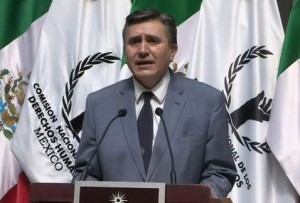
11/30/14 (written by cmolzahn) — The Mexican Senate has selected Luis Raúl González Pérez as the new president of the National Human Rights Commission (Comisión Nacional de los Derechos Humanos, CNDH). González Pérez gained the vast majority of votes, garnering 97 of 107, scoring a decisive victory over fellow candidates Mauricio Farah and Irene Herrerías. He took the oath of office in front of the Senate immediately following the vote.
This was the second time that González Pérez was a finalist for the CNDH presidency; in 2009 he competed with Emilio Álvarez Icaza and eventual CNDH President Raúl Plascencia. Before the Senate, he touted 35 years of public service, including 17 in the education sector. He holds a law degree from the National Autonomous University of Mexico (Universidad Nacional Autónoma de México, UNAM), where he was also a law professor and held various administrative positions. He was also a founding member of the CNDH, serving as investigator general (visitador general) in 1995-1996 where he led the investigation into the murder of 17 people in Aguas Blancas, Guerrero that resulted in a recommendation from the agency that he claims led to the resignation of the state attorney general at the time, Antonio Alcocer Salazar. He also led the program for disappeared persons from the 1970s for the CNDH, as well as the organization’s program for women’s issues, and was general director for indigenous issues and for attention to affronts to journalists. González Pérez’s most high profile work was as the special prosecutor from 1996 to 2001 for the federal Attorney General’s Office (Procuraduría General de la República, PGR) in the case of the murder of presidential candidate Luis Donaldo Colosio. The investigation he led reached the controversial conclusion that there was a lone gunman in the assassination, and that no political or criminal interests were involved in the murder. González Perez’s involvement with the case, as well as perceived ties with the “bureaucratic elite” has led some, particularly the newspaper Proceso, to criticize his appointment to head the CNDH, arguing that he is “too far from the social recognition required of an authentic defender of Human rights,” particularly given Mexico’s current challenges. Moreover, Proceso argues, it was not González Pérez’s investigation of Aguas Blancas for the CNDH that led to Alcocer Salazar, but rather a special investigation by Mexico’s Supreme Court (Suprema Corte de Justicia de la Nación, SCJN); it also discounts his time in charge of the CNDH journalist protection program, leaving only an “accumulation of case files.”
During his candidacy for the CNDH presidency, González Pérez proposed several changes to the institution, including improving the system for receiving complaints, attention paid to victims, and a public awareness campaign to improve citizen awareness of human rights. He also proposed strengthening communication between the CNDH and other domestic and international human rights organizations, and with public authorities; creating a national program to prevent human rights violations; and strengthening procedures for training public servants in preserving human rights. Finally, he proposed a more open stance from the agency, improving transparency and accountability and working to reach out to Mexican society.
González Pérez assumes his position at a time when Mexico is facing crises on several fronts, most notably the disappearance of the 43 teacher trainees in Iguala, Guerrero in September, and the widespread protests that have followed. Also at hand for the new CNDH president will be the apparent execution-style killing of suspected criminals by members of the Mexican Army in Tlatlaya. Senator Roberto Gil from the National Action Party (Partido de Acción Nacional, PAN) and president of the Senate’s justice commission said that these two events would need to be the top priorities for the new CNDH president.
Majorities in all parties represented in the Mexican Senate opted to reject the possibility of reappointing the now outgoing CNDH President Raúl Plascencia, who had served in the position since November 2009. During Senate deliberations over the new CNDH president, Plascencia was the target of much criticism, particularly from the Party of the Democratic Revolution (Partido de la Revolución Democrática, PRD), whose members accused Plascencia of having a dismissive and complacent attitude toward human rights violations and abuse of authority. PRD vice coordinator Dolores Padierna said that González Pérez is inheriting an institution “damaged in its credibility and incapable of fulfilling the duty it has.” She held up the CNDH’s hands-off treatment of Tlatlaya as an example of how Plascencia, despite the CNDH’s constitutionally guaranteed autonomy, has been subordinate to federal and state executive powers.
Sources:
Robles de la Rosa, Leticia. “Descartan a Plascencia para seguir en la CNDH.” Excelsior. November 12, 2014. http://www.excelsior.com.mx/nacional/2014/11/12/991834
Carrasco Araizaga, Jorge. “González Pérez a la CNDH, más de lo mismo.” Proceso. November 13, 2014. http://www.proceso.com.mx/?p=387585
Guerrero, Claudia. “Elige Senado a nuevo titular de CNDH.” El Norte. November 13, 2014. http://www.elnorte.com/aplicaciones/articulo/default.aspx?id=392794
“De dónde viene Luis Raúl González Pérez?” Milenio. November 13, 2014. http://www.milenio.com/politica/Raul_Gonzalez_Perez-ombudsman_nacional-presidente_de_CNDH-caso_Colosio-Aguas_Blancas_0_408559209.html




